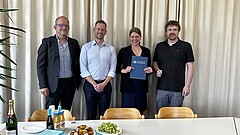Meike Grimme promoviert erfolgreich über "AI in Media Organisations: Factors Influencing the Integration of AI in the Newsroom" [21.06.24]
Am 20. Juni 2024 hat Meike Grimme erfolgreich ihre kumulative Dissertationsschrift verteidigt. Wir gratulieren ganz herzlich!Gutachter
Erstgutachter: Prof. Dr. Jens Vogelgesang
Zweitgutachter: Prof. Dr. Christian Zabel (TH Köln)
Vorsitzender der mündlichen Prüfung: Prof. Dr. Bernd Ebersberger
Abstract
Artificial intelligence (AI) is increasingly determining how media content is presented to audiences and how we see and consume it. In November 2022, the rise of ChatGPT, an AI chatbot with one of the fastest-growing user bases in history, highlighted how advanced AI can process content and natural language, how rapidly it can learn, and how many (normally human) tasks intelligent technology can perform. In an interview with CNBC in May 2023, Elon Musk indicated that AI will soon exceed biological intelligence and may endanger humanity if the public does not take concerns seriously and slow down its development. It is becoming increasingly clear that there is an immense need to learn how to responsibly contend with AI since technology is developing rapidly and not always in a transparent way, especially if this lack of transparency about its functioning leads to a certain degree of uncontrolled progression. This dissertation contributes to knowledge on the development of a responsible approach to AI in the news media sector, particularly how to work and meaningfully integrate content-generating and content processing AI in newsrooms. It examines both the positive and negative factors that influence AI integration. Four examination strings are pursued: two critical strings relate to rejection factors and challenges of AI in the journalistic field and two strings relate to criteria and factors that support and drive collaboration between newsworkers and AI.
Empirically, the strings are qualitative in nature, as the research consists of a systematic literature review of scientific journal articles and case studies on current AI projects in the German news media industry. Furthermore, this dissertation is anchored in several theoretical fields. The empirical results on factors influencing the integration of AI in the newsroom contribute to theory and practice in different ways, such as reflecting task allocation in the newsroom, shifts in responsibility, compliance issues, process innovations and providing future scenarios on how to re-organise the newsroom. Besides the main anchorage in media management research, theories from journalism studies must also be considered due to the
fundamental role of journalism in democracy and society and the possible impact of applying AI in these fields. The research question about factors influencing AI integration also opens up the direction to technology adoption theory. Moreover, human-machine communication theory is considered to examine factors in AI integration from a bidirectional human-AI interactivity perspective in order to understand the reciprocal, interactional conditions. In the final part of the thesis, the theoretical strings and practical implications are discussed and linked to provide an outlook on possible newsroom developments through AI in the future. The thesis aims to reduce complexity and uncertainty to approach the question of how to contend with AI in the newsroom and ultimately maintain journalistic quality.

